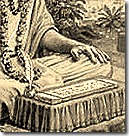 “The fallen souls are very eager to receive novel information every day, and the transcendentalists like Vyasadeva or Narada can supply such eager people in general with unlimited news from the spiritual world. In the Bhagavad-gita it is said that the material world is only a part of the whole creation and that this earth is only a fragment of the whole material world.” (Shrila Prabhupada, Shrimad Bhagavatam, 1.5.13 Purport) “The fallen souls are very eager to receive novel information every day, and the transcendentalists like Vyasadeva or Narada can supply such eager people in general with unlimited news from the spiritual world. In the Bhagavad-gita it is said that the material world is only a part of the whole creation and that this earth is only a fragment of the whole material world.” (Shrila Prabhupada, Shrimad Bhagavatam, 1.5.13 Purport)
Shri Krishna is so attractive that stories describing His activities that one would otherwise consider ordinary are worth hearing about. With the average person, learning of how they go about their day, what they do in the morning, who they talk to and where they travel to is not that important or interesting. Take the same activities but change the object in question and you can get a hit reality television series with millions of viewers each week. The same holds true with famous films and novels. With Krishna, the stories don’t have to be created, as His potency is unlimited. All that is needed is proper storytellers, roles for which Narada Muni and Vyasadeva
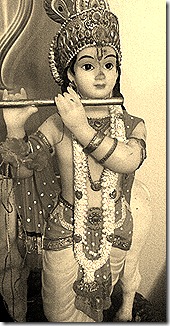 Vyasadeva is considered Krishna’s literary incarnation and Narada Muni is his spiritual master Vyasadeva is considered Krishna’s literary incarnation and Narada Muni is his spiritual master
In a land where Krishna’s presence is only felt in an impersonal manner, the practice of regulative principles is required in order to take advantage of that presence. Just knowing that there is a personal form of God that should be connected to is rare enough, but then actually carrying through on the practices aimed at forging that connection is another story altogether. To aid the conditioned living beings in their quest for transcendental enlightenment, Krishna sends forth various representatives. Vyasadeva and Narada are two of the most famous helpers for mankind in general.
Vyasadeva is a literary incarnation, responsible for putting into written word so much of Vedic wisdom that was previously known to the keepers of the faith. The science of self-realization, the real definition of dharma, or religious practice, was initially passed down to Lord Brahma, the first created living entity. Implanted into Brahma’s heart, the Veda was the guiding principle for all creatures, yet only the intelligent species could understand it. All forms of life in this world have sprung from Brahma. Even if one doesn’t want to believe in their relation to the heavenly creator, it is an accepted fact that we initially came from somewhere. Because of the influence of time, the knowledge of past generations may not be known with certainty, but we do know that we have ancestors, for life comes from life.
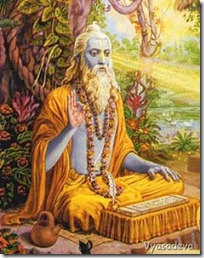 In ancient times the Veda was passed on through aural reception. One person heard the information and then passed it on to their sincere disciples, those interested in hearing the Veda and incorporating its teachings into their lives. Vyasadeva saw the need for recording Vedic wisdom in books and poems. He took past, present and future events relating to God and compiled Puranas, or ancient works consisting of historical events presented in story format. He also authored the Mahabharata In ancient times the Veda was passed on through aural reception. One person heard the information and then passed it on to their sincere disciples, those interested in hearing the Veda and incorporating its teachings into their lives. Vyasadeva saw the need for recording Vedic wisdom in books and poems. He took past, present and future events relating to God and compiled Puranas, or ancient works consisting of historical events presented in story format. He also authored the Mahabharata
Narada Muni was Vyasadeva’s spiritual master who specifically instructed him to compile a Purana relating only to the Supreme Lord Krishna and devotion to Him. Within the other Puranas, bhakti-yoga, ordevotional service
Hari is another name for Krishna which means one who removes the impediments of His devotees. The greatest stumbling block towards acquiring transcendental knowledge is the attachment to material nature that one forms right at the time of birth. It’s strange to think, but the sadness we feel from separation is actually not warranted. That’s because the attachment was formed at some point in time, which means that we were just fine before the attachment came to be. For instance, if we lament over the loss of fortune, we know that previously, at the time of birth, there was nothing acquired through hard work. The later fortune had to be earned through either risk in a business venture or in rarer cases inheritance from previous generations of family members. The same principle of attachment applies to the lamentation that comes from the severing of relationships. In a romantic relationship turned sour, there was a time when we didn’t know the person we were later sad about.
Therefore every lamentation in life is a product of illusion, a temporary attachment that didn’t relate to our true identity. The spirit soul is transcendental to all manifestations of matter. It remains the source of identity at any period in life, even in the future. In the past, we existed somewhere, but right now we don’t specifically know where or under what circumstances. In the future we will continue to exist as well, as the soul cannot be killed.
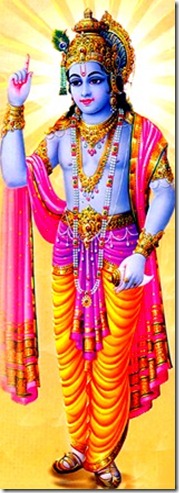 Elation comes from finding something supremely attractive. If the subject matter is glorious enough, something as simple as hearing can provide the happiness the soul deserves. Vyasadeva, under the direction of Narada, took to compiling the Bhagavata Purana, which is also known as the Shrimad Bhagavatam Elation comes from finding something supremely attractive. If the subject matter is glorious enough, something as simple as hearing can provide the happiness the soul deserves. Vyasadeva, under the direction of Narada, took to compiling the Bhagavata Purana, which is also known as the Shrimad Bhagavatam
Since Krishna is God and so attractive, the stories relating to His pastimes prove to be wonderfully enthralling to the heart. Since Vyasadeva knew that not everyone would accept Krishna as the Supreme Lord right away, and that with that lack of understanding some might not appreciate His pastimes in the same way that one who is liberated from material association would, he sequenced His Bhagavatam in such a way that Krishna’s position as God is explained in the first nine sections, with the holy grail, the sweet fruit of the work, placed into the tenth canto. In this latter section are found Krishna’s childhood pastimes, which captivate the mind, thrill the heart, and are so attractive that they can be heard over and over again without exhaustion.
Though cult films are repeatedly watched by their fans, eventually there comes a time when a new film is anticipated or some other interest takes over the fanatic. With Krishna, His pastimes are so enchanting that hearing about them again and again only increases one’s knowledge of the Lord. With further awareness of Krishna’s position comes even more appreciation of His activities and distribution of causeless mercy to the surrendered souls. With each successive dip into the holy lake made up of Krishna-lila, the refreshed individual gains an enhanced appreciation for Krishna’s associates and how they practice devotion. A sort of top down approach, from appreciating Krishna love for other living entities naturally springs forth.
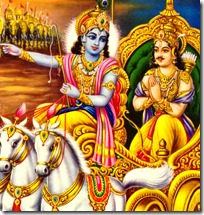 Even dry philosophy becomes attractive when Krishna is attached to it. The Bhagavad-gita, which is a small section of Vyasadeva’s Mahabharata, contains the direct teachings of Krishna. It is not filled with pastimes so much. It has deep wisdom, cutting logic, and truths of life not found in any other text. No other spiritual tradition identifies the individual as spirit soul right in the beginning, when there is the seed of doubt as to what action should be followed. From that identification, the living entity can further understand his position and what needs to be done to find lasting happiness, the kind which corresponds with the primary properties of the soul, namely its eternality, bliss and knowledge. Even dry philosophy becomes attractive when Krishna is attached to it. The Bhagavad-gita, which is a small section of Vyasadeva’s Mahabharata, contains the direct teachings of Krishna. It is not filled with pastimes so much. It has deep wisdom, cutting logic, and truths of life not found in any other text. No other spiritual tradition identifies the individual as spirit soul right in the beginning, when there is the seed of doubt as to what action should be followed. From that identification, the living entity can further understand his position and what needs to be done to find lasting happiness, the kind which corresponds with the primary properties of the soul, namely its eternality, bliss and knowledge.
Through Narada’s persuasion, Vyasadeva gave mankind the jewel of Vedic literature, the Bhagavatam which is still relished to this day. Krishna can be thought about and described day after day, with the mind finding new lessons to take away and attachment to the one person who never leaves any of us increasing. With ordinary stories, the right characters and sequence of events need to be crafted by the author in order to catch the interest of the listener. With Krishna, the attractiveness permeates every one of His behaviors, so just hearing about the Lord’s interactions with mother Yashoda, His stealing of butter from the neighbors, His dancing with the cowherd girls of Vrindavana
In Closing:
In hearing of stories there is already interest,
To give the ears the much desired happiness.
With ordinary stories one finally gets bored,
Not much wisdom or lessons in them stored.
Not the case with Krishna who is most attractive,
Hearing His pastimes mind finds right perspective.
Narada Muni and Vyasadeva greatest storytellers,
Preaching bhakti-yoga, of most valuable jewel sellers.
For hearing their words there is not any cost,
Such pleasurable sound that you’ll never exhaust.
|
Search This Blog
Wednesday, January 11, 2012
Daily Reminder
Subscribe to:
Post Comments (Atom)
No comments:
Post a Comment